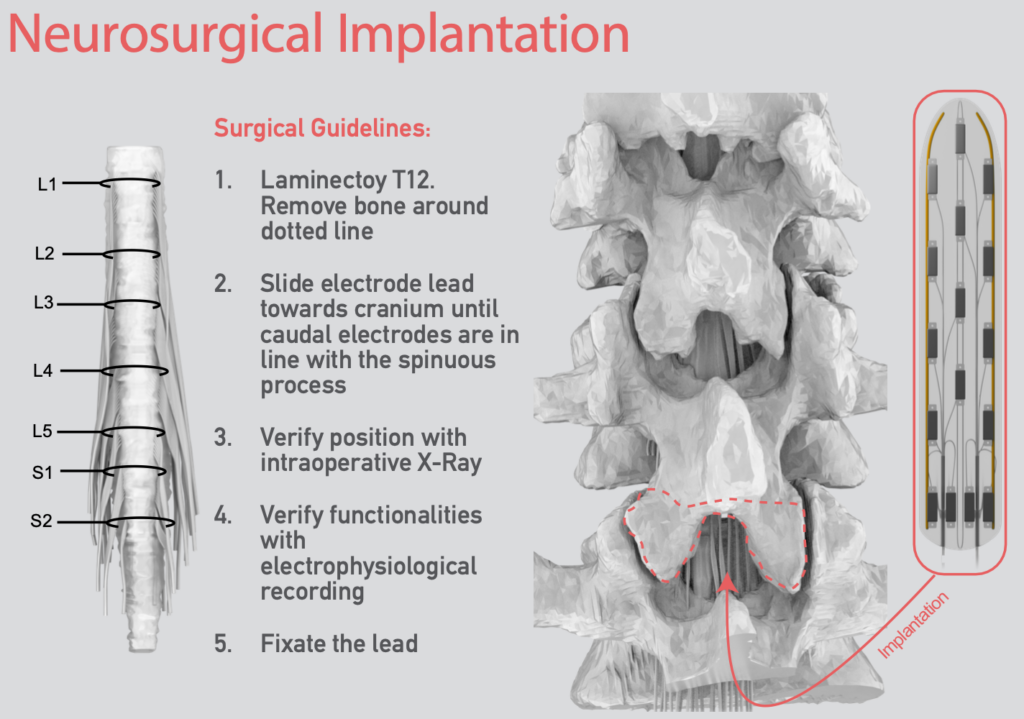Student projects
Areas of Interest
General Research Topics
- Digital Twins (3D Models, Multiphysics Simulations, Biophysical Neural Models, Optimization)
- Neural Mechanisms (Spinal Cord Anatomy, Circuits & Behavior)
- Neural Engineering (Spinal Cord Stimulation, Neuromodulation)
- Clinical Decision Support
If you want to do a project / thesis with us, feel free reaching out.
Contact
Master’s Thesis
Non-Invasive Brain Stimulation & Computational Modeling for Mood Regulation
Background
Severe depression remains a major challenge in modern medicine — often resistant to both pharmacological and psychotherapeutic treatments. While deep brain stimulation (DBS) has demonstrated rapid and long-lasting relief in clinical studies, it is invasive and reserved for the most extreme cases.
Our research is exploring the next frontier:
Can non-invasive brain stimulation (NIBS) be optimized to selectively target the same deep brain circuits responsible for mood regulation, such as the medial forebrain bundle, anterior cingulate cortex, or dorsolateral prefrontal cortex? With the help of temporal inference stimulation, computational modeling, and neuron-level simulation, this thesis aims to find out.
Thesis Topic
You will investigate whether key brain regions involved in mood disorders can be selectively and effectively stimulated via non-invasive techniques, using state-of-the-art simulation software.
Key tasks include:
- Developing and optimizing NIBS protocols (temporal interference)
- Simulating electrical field propagation using:
- TIP 4.0 (IT’IS Foundation), or alternatively
- Sim4Life or open-source solvers like FEniCS
- Evaluating selectivity and safety through computational modeling
What We Offer
- Work at the forefront of digital health and neurotechnology
- A chance to contribute to future non-invasive treatments for depression
- Supervision in English and/or German
- Flexible working: Remote and/or at our Chair
- A collaborative, tech-savvy, and open-minded research environment
Your Profile
- Background in Biomedical Engineering, Medical Informatics, Medical Technology, or related
- Interest in neurostimulation, simulation, and modern tools
- Self-motivated and curious about trying out new methods
- Basic programming experience (e.g., Python)
Ready to Join?
Send your CV and transcript of records via email to the contact person listed.
Start date: As soon as possible
This project not only advances academic understanding — it directly supports the development of safer, more effective brain therapies that could change how we treat depression in the coming years.
We look forward to hearing from you!
Contact
Markus Deglmann, M. Sc.
- Phone number: +49 9131 85-23605
- Email: markus.deglmann@fau.de
If you do have any suggestion, feel free reaching out to Prof. Dr. Andreas Rowald.
Bachelor’s Thesis
Currently there are no open topics.
If you do have any suggestion, feel free reaching out to Prof. Dr. Andreas Rowald.
Seminars, labs, and other projects
This section contains projects available for students that can be flexibly assigned to fulfil curriculum requirements.
Translating Research to Clinical Practice - A Clinical Decision Support Tool Demonstrator
Background

Clinical decision support tools play a pivotal role in bridging the gap between research findings and their application in clinical practice. These tools serve as invaluable aids for healthcare professionals by synthesizing vast amounts of medical knowledge into actionable insights at the point of care. By integrating evidence-based guidelines, patient data, and best practices, they empower clinicians to make well-informed decisions tailored to individual patients. This not only enhances the quality and efficiency of care but also ensures that the latest advancements in medical research are effectively incorporated into clinical workflows. Moreover, clinical decision support tools contribute to standardization and consistency in care delivery, ultimately leading to improved patient outcomes and safety.
This model is modified by Rowald et al. 2022
Aim
The primary goals of building a functional prototype for a web-based clinical decision support tool are to validate the concept, gather user feedback for refinement, demonstrate feasibility, and identify and address technical and usability challenges early in development. This iterative process ensures the eventual creation of a robust and user-friendly tool that enhances patient care and outcomes.
In addition to ensuring basic functionality, particular emphasis will be placed on designing the prototype with a focus on user experience and cross-device compatibility. A sleek and intuitive design, coupled with seamless functionality across various devices such as desktops, tablets, and smartphones, is essential for ensuring widespread adoption and usability among healthcare professionals. This emphasis on design excellence aims to create a visually appealing and accessible interface that enhances user engagement and efficiency in clinical decision-making processes.
| Project type | Project |
| ECTS | 5 or 10 (negotiable) |
| Language | English/German |
| Period | Start upon agreement / ASAP |
| Presence time | Virtual and/or at the Chair of Digital Health |
| Useful knowledge | Webdevelopment / FullStack |
| Work distribution | 100 % programming |
| StudOn link | N/A |
| Registration | E-mail with CV and transcript of records to contact person |
Contact
If you do have any suggestion, feel free reaching out to Prof. Dr. Andreas Rowald.


